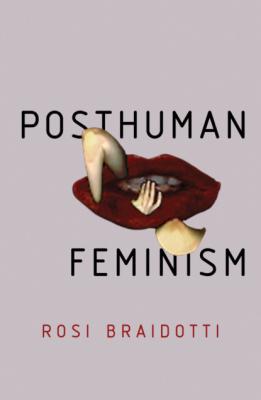ТОП просматриваемых книг сайта:
Posthuman Feminism. Rosi Braidotti
Читать онлайн.Название Posthuman Feminism
Год выпуска 0
isbn 9781509518111
Автор произведения Rosi Braidotti
Жанр Социология
Издательство John Wiley & Sons Limited
295 297
296 298
297 299
298 300
299 301
300 302
301 303
302 304
303 305
304 306
305 307
306 308
307 309
308 310
309 311
310 312
311 313
312 314
313 315
314 316
315 317
316 318
317 319
318 320
319 321
320 322
321 323
322 324
323 325
324 326
325 327
326 328
Dedication
For Anneke
Posthuman Feminism
Rosi Braidotti
polity
Copyright Page
Copyright © Rosi Braidotti 2022
The right of Rosi Braidotti to be identified as Author of this Work has been asserted in accordance with the UK Copyright, Designs and Patents Act 1988.
First published in 2022 by Polity Press
Polity Press
65 Bridge Street
Cambridge CB2 1UR, UK
Polity Press
101 Station Landing
Suite 300
Medford, MA 02155, USA
All rights reserved. Except for the quotation of short passages for the purpose of criticism and review, no part of this publication may be reproduced, stored in a retrieval system or transmitted, in any form or by any means, electronic, mechanical, photocopying, recording or otherwise, without the prior permission of the publisher.
ISBN-13: 978-1-5095-1807-4
ISBN-13: 978-1-5095-1808-1 (pb)
A catalogue record for this book is available from the British Library.
by Fakenham Prepress Solutions, Fakenham, Norfolk NR21 8NL
The publisher has used its best endeavours to ensure that the URLs for external websites referred to in this book are correct and active at the time of going to press. However, the publisher has no responsibility for the websites and can make no guarantee that a site will remain live or that the content is or will remain appropriate.
Every effort has been made to trace all copyright holders, but if any have been overlooked the publisher will be pleased to include any necessary credits in any subsequent reprint or edition.
For further information on Polity, visit our website: politybooks.com
Acknowledgements
This book would not have been possible without the loyal support of my publisher John Thompson; I truly thank him for his friendship and his enduring commitment to my posthuman project.
I had the honour and pleasure of completing the research for this manuscript at the University of Cambridge, where I was invited as Diane Middlebrook and Carl Djerassi Visiting Professor in Gender Studies in the Autumn term 2019. My sincere thanks to Jude Browne, Lauren Wilcox and Holly Porter for their warm and collegial support during my stay. My heartfelt thanks to Joanna Bush for all her precious professional assistance. In the same period I was honoured to be a visiting fellow at St. John’s College, Cambridge. My sincere thanks to my sponsoring fellow, Ulinka Rublack for her friendly advice and mentorship, to the interim President of the College, Steve Edgley, and the deputy master Tim Whitmarsh for their warm welcome.
During the research phase of this book, I also greatly benefited from the discussions with colleagues from several academic institutions I had the honour to visit. My special thanks to Eléonore Lépinard and the Gender Studies Programme at the University of Lausanne in Switzerland, and to Marianne Hirsch of the Institute for Research on Women, Gender and Sexuality at Columbia University in New York.
Sections of this book were published in my chapter in the Oxford Handbook of Feminist Theory (eds. Lisa Disch and Mary Hawkesworth, 2016) and in Anthropocene Feminism (ed. Richard Grusin, 2017). I acknowledge them warmly here. Some earlier drafts were also published in the Posthuman Glossary that I co-edited with Maria Hlavajova (2018).
My sincere thanks to Genevieve Lloyd and Donna Haraway for their unflinching support and enlightening criticism. They are precious multi-species travelling companions of my writings. Thanks to Simone Bignall and Matthew Fuller and for their generous insights and theoretical advice.
I am much indebted to Emily Jones for her generous and informed reading of the manuscript and her rigorous comments. Warm thanks also to Beth Lord, Celia Roberts, Djurdja Trajkovic, Maureen McNeil, Christine Daigle, Nina Lykke and Maurita Harney for their comments and support. Thanks also to Premesh Lalu, Sarah Nuttall and J. Halberstam for lively and necessary conversations. Thank you Linda Dement for the stunning image for the cover.
I am grateful to Marlise Mensink and Mischa Peters for their warm friendship. I also wish to thank my personal research assistants Gry Ulstein, Evelien Geerts, Lauren Hoogen Stoevenbeld and especially Onessa Novak for their unfailing logistical and organizational assistance.
Finally, my gratitude to my life partner Anneke Smelik for her intellectual, emotional and moral support, and for the joy of our life together.
Introduction: Feminism by Any Other Name
‘Don’t agonize, organize!’
Flo Kennedy, 19711
What a time to dare to take on the present, defined as the record of what we are ceasing to be, and the seed of what we are in the process of becoming!
Flashback to 1992: at the physical site of the watershed art exhibition Post Human (Deitch, 1992), a giant female figure of an Armani-clad business woman confidently welcomed visitors to the show. This cutting-edge exhibition displayed multiple variations of the new micro-femininities being constructed at that moment in technological culture. The curator Jeffrey Deitch captured the avant-garde spirit of the age by foregrounding the role of technology in blurring the binary boundaries between subjects and objects, humans and non-humans. The exhibition showed that body improvement and the embrace of artificiality were becoming the norm: plastic surgery, dieting, exercises, mind-altering drugs and other practices enhance the humans beyond their dreams. The Post Human showed also that art assumed a much more central role as it merged with science, computerization and biotechnology in further re-shaping

